If you’ve ever had breakfast for dinner-pancakes, waffles, even scrambled eggs-you know what fun it can be to swap a meal. Why not try it the other way around? “Many cultures eat what Americans view as dinner foods for their first meal of the day,” explains Mary Hartley, R.D., an online nutritionist from New York City. And since breakfast is still the most important meal you can eat health-wise, adding new foods to your repertoire not only varies the nutrition, it keeps you from getting bored. Plus, eating a heartier “dinner” meal helps fill you up so you eat less throughout the day. Here are eight foods-and serving ideas-to make over your morning meal.
Soup
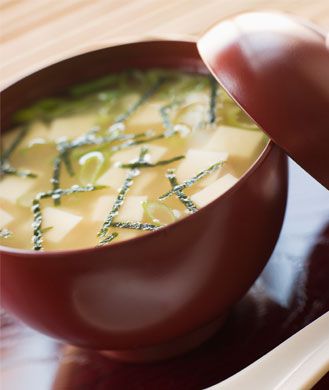
Miso soup specifically, though any broth-based soup is a good choice, especially if it's packed with veggies and lean protein (stay away from the bisques or cream-based soups). Miso soup, popular in Japan, is fermented, and according to Hartley, fermented foods can help populate the digestive system with good bacteria that strengthen the immune system, as well as help you better process nutrients from all the foods you eat throughout the day. Next time you order takeout, save the soup that comes with your sushi for breakfast.
Beans
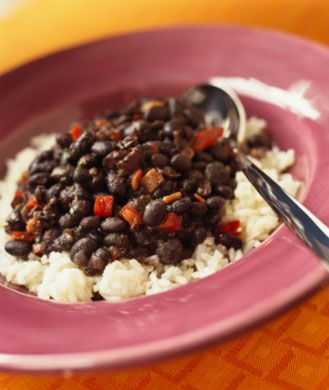
Beans on toast are a popular breakfast in the UK, and they're eaten with a grain (rice or tortillas) in the morning all throughout South America and Africa. The reason: When you combine beans with grains, it becomes a complete protein-and as high a quality protein as animal sources. Plus, the fiber in beans, about 16 grams per cup, has all sorts of important health benefits, from aiding digestion to lowering bad cholesterol. Red, black, or low-sodium baked beans are your best bets.
Rice
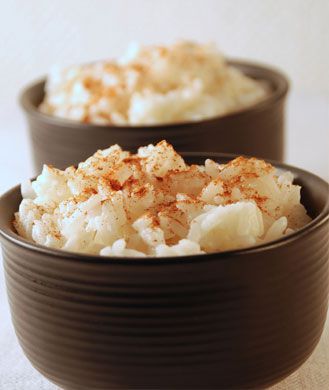
Oatmeal isn't the only whole grain you can eat for breakfast. Rice, barley, bulgur, quinoa, farro, and other whole grains make a terrific hot morning meal, and they work well with all the same fixings that make oatmeal taste better than wheat paste-and most have a heartier, nuttier flavor.
Cook whole grains ahead of time in batches and reheat for breakfast, adding things like milk, fruit, nuts, seeds, and/or spices. Compared to refined grains (white flour, white bread, white rice), whole grains have 18 additional important vitamins and minerals to help you stay full and focused all morning.
Chopped Salad
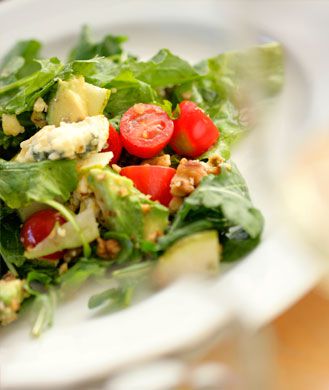
Considering that experts recommend eight to 10 servings of vegetables per day, it makes sense to get a serving or two from your first meal. In Israel breakfast salad-typically chopped tomatoes, cucumbers, and peppers, dressed with fresh lemon juice and olive oil-is served with cheese and eggs. Pump up the protein at home by adding a hard-boiled egg, meat, beans, nuts, or seeds. Or try interesting seasonal combinations, such as beets, pears, and walnuts.
Mushrooms
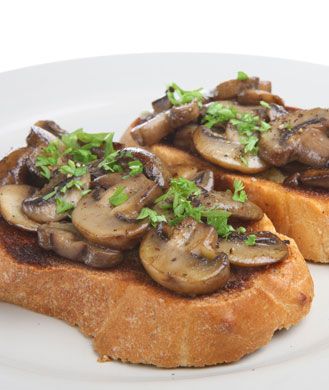
A classic breakfast side dish in the UK, mushrooms are a great addition to omelets, quiches, frittatas, and crepes. Or you can simply sauté a batch and eat them piled on toast with a slice of cheese. Mushrooms are ultra-low in calories and fat but have a meaty texture that adds bulk, plus they're loaded with essential B-vitamins, potassium, and selenium. When growing mushrooms are exposed to sunlight, they're also a natural source of vitamin D.
Fish
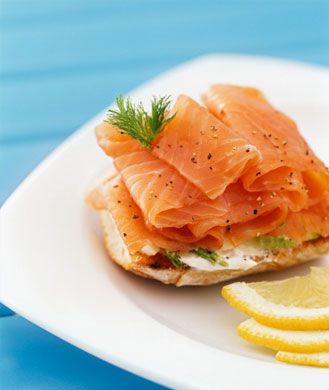
Whether it's kippers in the UK, lox in Scotland, or pan-fried herring in Nova Scotia, travel outside the U.S. and there's a good chance you'll find fish on the breakfast table. While early-morning seafood might not appeal to everyone, smoked fish (like lox) has a mild, savory flavor that even non-fans can wake up to. Plus, all fish is loaded with protein and healthy omega-3 fats, as well as vitamin D and selenium.
Try a few slices of smoked salmon sans the bagel and cream cheese, or sauté a filet of your favorite variety in the same amount of time it would take to make scrambled eggs.
Tofu
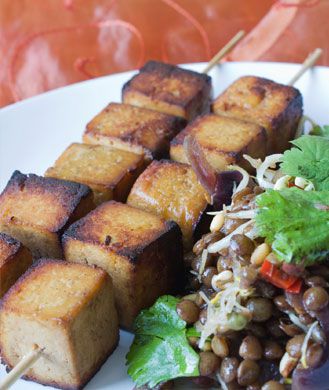
While you might associate tofu with meatless Mondays or Thai takeout, it's actually the perfect breakfast food because it can be used in so many ways: scrambled, sauteed in cubes and mixed with vegetables, or blended into a smoothie-which is why it's as ubiquitous a breakfast food as eggs and cold cereal in countries like Japan and India.
Tofu is high in protein but low in calories, fat, and sodium. It also contains omega-3 fatty acids. Just be sure to store it properly, as the heart-healthy fats in tofu can degrade with exposure to light and air.
Hummus
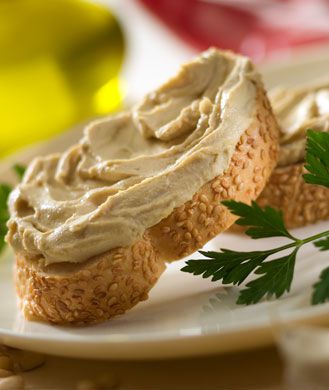
You eat it with carrots at 11 a.m., so why not bump it up a few hours? Hummus is commonly eaten for breakfast in the Middle East, and it's incredibly healthy. The combination of dried chickpeas, tahini, and olive oil results in a puree that's rich in vitamin E, antioxidants, calcium, iron, protein, fiber, vitamin A, and thiamine. Slather it on some toast instead of peanut butter, eat it with veggies, or pair with some avocado slices and a spritz of lemon juice.



































